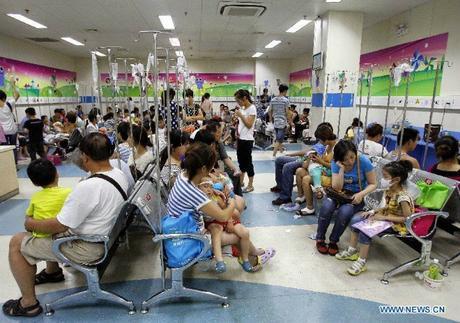
“Ummm….you want her to do what, where?!” “On an A4 piece of paper, no less?!”
The doctor’s office, Xi’an circa 2015.
Ask any expat in Xi’an, what their worst fear is, living in China….and usually at the top of the list (next to pollution) is: getting sick!
Or even worse, your kids getting sick.
I’m not gonna lie, healthcare in China, well, second-tier China at least, is not as we know it.
The inevitable language barrier only adding to what can range from a rather amusing experience (you can read all about a couple of such trips to the local doctor we had here, including our visa medical) to a downright terrifying one!
Rewind this time 12 months ago and my ‘Small Person’ got sick with gastro. A bug that literally debilitated her for about five days…and then of course went through most of the family including our visitors (an expat’s second worst nightmare)!
With no sign of improvement it was time to get our three year old to a local doctor, which in China usually means the hospital. With me down and out, wavering in and out of any coherent ability to function, the hotelier had the unenviable task of dragging her out of bed and taking her to the one and only English speaking doctor in the city.
On cue she was asked to give a number two sample. All relatively straightforward, I guess…except for the small fact that she hadn’t eaten for days, so this was about as likely to happen as a China winter with no pollution! Alas, this small but pertinent issue aside….she was encouraged to produce it there and then, IN the doctor’s room, ON the doctor’s floor, ON a piece of A4 paper (actually, make that half a piece of A4).
What I would give to see the look on the hotelier’s face! 😉
Thankfully that and the time we had to take Small Person with croup in to the hospital to use their nebuliser (we’ve since invested in our own to save on the trauma) means our hospital experiences have been limited.
For other expats, it seems lessons have been learned. A recent Facebook status by a fellow expat says it all: “My boy fell and split his head open, we opted to try and fix it ourselves to avoid the trauma of a Chinese hospital.”
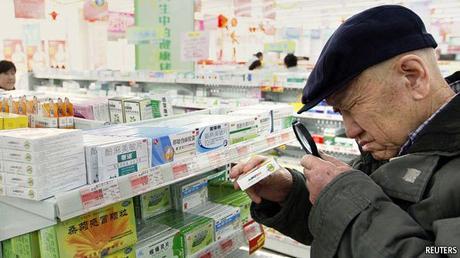
Expats who live here for any length of time become masters at diagnosing and treating themselves with a host of medical supplies they’ve stocked up on from back home. I’ve even heard the story of one woman who’s been here for eight years and literally lanced and sterilised her child’s infected toe, herself! The trauma of this far less than the ordeal of visiting a local hospital.
Another friend went to the doctor about a small gastro problem (unfortunately more common than us Wai Guo ren (foreigners) would like) and was promptly admitted to hospital, indefinitely. In what could be the worst situation to be sans toilet paper, his bathroom was devoid of all manner of toilet accessories! (BYO?).
And to top if off, his only option for dinner, extremely spicy, pickled food. Not so soothing for the Du zi (tummy). Needless to say, he checked himself out, pronto!
A girlfriend’s little girl contracted pneumonia, which here in China means a daily trip in to the hospital to be treated with intravenous antibiotics. Oral antibiotics aren’t given out and there is only one type of broad spectrum antibiotic used for all of the potentially different strains. After three days of sitting in a chair lined up with a bunch of other sick children, her little hand taped to cardboard and the IV inserted, they insisted she be admitted to hospital. (FYI children under the age of two have the IV drip administered in their forehead! Not the most comfortable or comforting sight!)
My friend had the good fortune of being in a private hospital, which of course, like anywhere in the world is more often than not a step up from the public hospital.
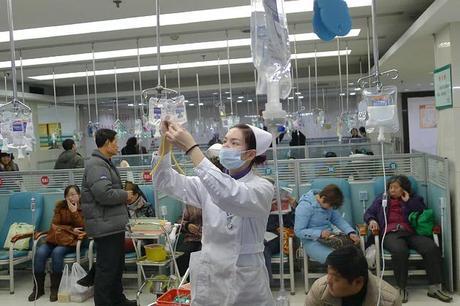
Even better at 600RMB a night, it was the VIP room. Still, no food was supplied….and it was BYO towels, soap….and Dettol.
While you might be expecting hygiene in a hospital (of all places) to be up to scratch…let’s just say, here, in China, it’s not exactly an environment awash with disinfectant.
My friend was partially relieved to see a mop present, but that relief was short-lived when she realised it was used (usually minus cleaning supplies) about as regularly as the sheets were changed….weekly!
Another friend has regular medication she needs to go into hospital, to get, weekly (because they won’t administer any more than a week’s dose). There is one dosage administered for ALL patients regardless of the patient’s individual requirements. (Is it just me, or does this have disaster written all over it?!)
And I’m guessing it’s not a good sign when the doctor asks you ‘which’ medication you think you might need?!
“Wait, what I have the flu and you want to give me an injection?” In China one such medical thought process is that an injection is far more beneficial because it enters the bloodstream quicker than oral antibiotics.
In all reality, if someone is seriously ill, most expats won’t hesitate to fly themselves or their children out to a major city like Hong Kong for treatment.
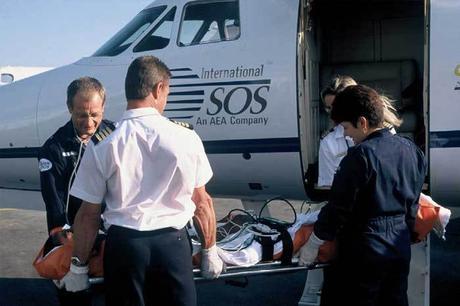
Thankfully there is a medical helpline called International SOS, whom most foreign companies are affiliated with. You can call up and speak English to professional doctors and send x-rays and test results to them to garner a second opinion, anytime you need to. They’ll also arrange for you to fly out. (Note: make sure you have international health insurance because without it, anything like this costs a small fortune and local health plans generally won’t cover evacuation or repatriation coverage)!!
For anyone, it’s a frightening thought to be stuck in a foreign hospital, let alone one where you don’t speak the language and don’t understand the process…. health insurance is an expat’s best friend the world over, here in China, it’s a necessity – especially with international medical insurers offering direct settlement at expat-friendly hospitals like United Family Hospital and Parkway Hospital in first tier cities like Shanghai and Beijing. Handy to know, if you don’t want to fly out in a non-emergency event.
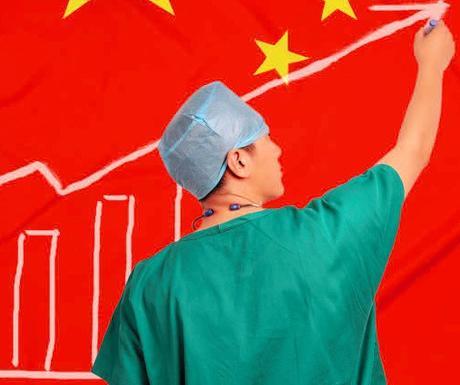
Despite these glaring anomalies that exist between the Eastern and Western medical worlds, healthcare in China has come a long way.
The Chinese government recently declared the pursuit of “Healthy China 2020,” a program to provide universal healthcare access and treatment for all of China by the year 2020. As of now 95 per cent of Chinese have some form of health cover but as encouraging as that is, bringing a population of 1.3 billion people out of the third world and into the 21st Century is not without it’s challenges.
While it means more locals than ever before now have access to major healthcare centres and hospitals – these centres are still playing catch up — the number of properly trained doctors and nurses are struggling to keep pace with demand for care.
In China, it’s unusual to get a formal appointment, mostly its about lining up and that can mean standing in an overcrowded room for hours on end to register yourself and then pre-pay your account.
Often, no matter how sick you might be, if there is no signature or no money, treatment is put on hold! Note: A) This is potentially a little tricky if you can’t read the forms and B) a little dangerous if it’s a life and death situation.
Medical professors coming to Xi’an have declared the city 30 years behind in modern medical techniques.
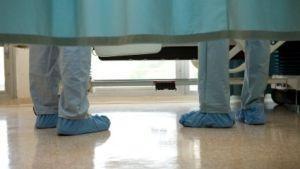
Unfortunately being a doctor in China is not all it’s cracked up to be. It’s not considered as prestigious a role as it is in the Western world and GPs are chronically underpaid.
While the government caps the prices of common medicines, other prescriptions come with kickbacks for the doctor leading to overprescription of expensive drugs, imaging tests and unnecessary and lengthy hospital stays. (Have gastro, don’t expect a quick exit!!)
For many Chinese families, an emergency medical procedure means going into debt. There is still a widespread perception that to get top quality care you need to show doctors Guan xi (relationship) or hong bao — red envelopes stuffed with cash.
A Chinese friend who had her baby in Xi’an a few years ago, had to do just this to make sure she could have her baby in what was deemed one of the city’s better hospitals.
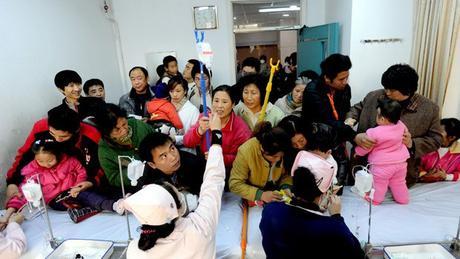
Hospitals in China are categorized through a system of numbers and letters, with the highest quality hospitals in the country being allocated the number 3 and the letter A. A 3B hospital will be slightly lower quality and 3C even lower still.
Husband’s are still generally not allowed into the delivery room for the baby’s birth….and the protocol is often on the patients to fend for themselves. My friend’s delivery was by no means straightforward and happened quickly.
She had to hoist herself from the waiting bed to the delivery bed with no help whatsoever (mid labour)! (In China, most doctors won’t lift you for fear of being held liable, if something goes wrong.) The same happened when the hotelier was visiting a sick colleague in hospital (with a head injury, I might add) and he had to be lifted from one bed to another. His parents and my husband had the honours.
During the delivery of my friend’s baby, the nurse refused to do a much-needed episiotomy unless she signed the papers, right then and there, during the height of labour!! No pen? What! Just reach for that handbag above your head! While you’re at it, be ready to write down the time, weight and date of birth yourself! (What do you think this is, a hospital!!??!)
Perhaps as an expat, the best option is to stick with TCM – Traditional Chinese Medicine! Most hospitals also have a TCM section where you can have a consultation and purchase your remedies there and then.
It is after all, considered China’s national treasure.
Proven over thousands of years, how can you go wrong?
As they say….when in Rome…..
This is China!
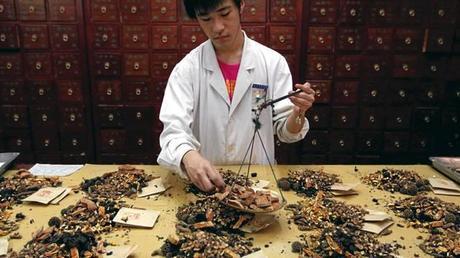
Psst.. a new expat and (after i’ve scared the c–p out of you) need to look at health insurance plans?….This might help.

